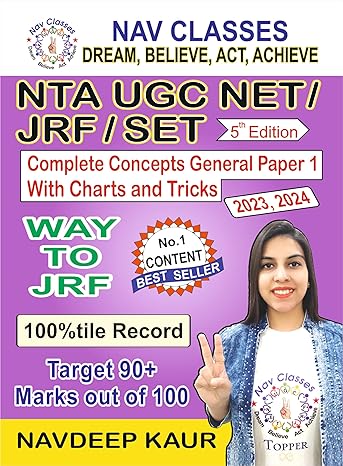Management of Higher Education
The Indian higher education system is one of the largest such systems in the World. It is estimated that during the X Five Year Plan period (2002-07), there will be a tremendous pressure of numbers on this system and a large number of additional students will be knocking at the doors of higher education institutions in the country.
There are also new challenges of management and regulation being faced by these institutions, which require serious attention, both at the institutions in the public sector and also those in the private sector now growing at a fast pace. As a result, the old structures of management established in pre-independent India and working during most of the twentieth century are now required to undergo drastic changes.
विश्व में भारतीय उच्च शिक्षा प्रणाली सबसे बड़ी प्रणालियों में से एक है। यह अनुमान लगाया गया है कि X पंचवर्षीय योजना अवधि (2002-07) के दौरान, इस प्रणाली पर संख्याओं का भारी दबाव होगा और बड़ी संख्या में अतिरिक्त छात्र देश में उच्च शिक्षा संस्थानों के दरवाजे पर दस्तक देंगे।
इन संस्थानों द्वारा प्रबंधन और विनियमन का सामना करने की नई चुनौतियां भी हैं, जिनके लिए सार्वजनिक क्षेत्र में संस्थानों और निजी क्षेत्र में भी तेजी से बढ़ रही है, दोनों को गंभीर ध्यान देने की आवश्यकता है। नतीजतन, पूर्व-स्वतंत्र भारत में स्थापित प्रबंधन की पुरानी संरचनाएं और अधिकतर बीसवीं सदी के दौरान काम करने के लिए अब भारी परिवर्तन हो रहे हैं।
Besides, the demands of the society for equity and accommodation cannot be neglected any more.
इसके अलावा, इक्विटी और आवास के लिए समाज की मांगों को और अधिक उपेक्षित नहीं किया जा सकता है।
The new regime under WTO where competence is the cardinal principle of success in international operations has made it abundantly clear that the country should exploit its excellent potential in higher education and training facilities and prepare itself to export the Indian brand of education to foreign countries. Policy planning and evolving strategies for this task are somewhat new for the country. But, this is an opportunity which cannot be missed by India, as it offers interesting possibilities for strengthening of the nation’s talent and resourcefulness.
विश्व व्यापार संगठन के अंतर्गत नई व्यवस्था जहां क्षमता अंतरराष्ट्रीय परिचालनों में सफलता का मुख्य सिद्धांत है, यह बहुत स्पष्ट रूप से साफ कर चुका है कि देश को उच्च शिक्षा और प्रशिक्षण सुविधाओं में अपनी उत्कृष्ट क्षमता का फायदा उठाना चाहिए और विदेशों में शिक्षा के भारतीय ब्रांड को निर्यात करने के लिए खुद को तैयार करना चाहिए। इस कार्य के लिए नीति नियोजन और विकसित रणनीति कुछ देश के लिए कुछ नया है लेकिन, यह एक ऐसा अवसर है जिसे भारत द्वारा याद नहीं किया जा सकता, क्योंकि यह देश की प्रतिभा और कुशलता को मजबूत करने के लिए दिलचस्प संभावनाएं प्रदान करता है।
The following five sub-sections, cover important aspects of the deliberations, recommendations and action plans of UGC Golden Jubilee Seminars organized at different Universities in the country:
- Public/Private Partnership in Higher Education, at University of Calicut, Kozhikode, Kerala;
- Governance of higher Education, at University of Jammu, Jammu, J&K;
- Access and Equity in Higher Education, at G.C.D .University, Bilaspur, Chattisgarh;
- Export of Higher Education, at J.N.V. University, Jodhpur, Rajasthan and
- Policy Planning for Higher Education under WTO and GATT regimes at North Bengal University, Darjeeling, West-Bengal.
- Economics of Higher Education, at N. E. Hill University, Shillong, Meghalaya
देश के विभिन्न विश्वविद्यालयों में आयोजित यूजीसी स्वर्ण जयंती संगोष्ठी के विचार-विमर्श, सिफारिशों और कार्य योजनाओं के निम्नलिखित पांच उपखंडों में महत्वपूर्ण पहलुओं को कवर किया गया है:
- उच्च शिक्षा में सार्वजनिक / निजी भागीदारी, कालीकट विश्वविद्यालय, कोझिकोड, केरल;
- उच्च शिक्षा का शासन, जम्मू, जम्मू, जम्मू और कश्मीर विश्वविद्यालय में;
- जीसीडी में उच्च शिक्षा में प्रवेश और इक्विटी, विश्वविद्यालय, बिलासपुर, छत्तीसगढ़;
- जे एनवी में उच्च शिक्षा का निर्यात। विश्वविद्यालय,जोधपुर, राजस्थान और
- नॉर्थ बंगाल यूनिवर्सिटी, दार्जिलिंग, पश्चिम बंगाल में डब्ल्यूटीओ और जीएटीटी शासन के तहत उच्च शिक्षा के लिए नीति नियोजन।
- एन। ई। हिल विश्वविद्यालय, शिलांग, मेघालय में उच्च शिक्षा का अर्थशास्त्र
India has one of the largest Higher Education system in the world. There are a large number of Indian as well as foreign students who apply every year to Indian universities and colleges. For all those who wish to study in India, it is very important to get prior and correct information about the courses that you would like to undertake, the university you want to apply to and how to go about the application procedure. For an international student, it is also important to know the accommodation facilities, weather conditions, food habits and cost of living in the city in which he or she intends to study.
भारत दुनिया में सबसे बड़ी उच्च शिक्षा प्रणाली में से एक है। भारतीय और विदेशी छात्रों के लिए बड़ी संख्या में भारतीय और विश्वविद्यालय हैं जो हर साल भारतीय विश्वविद्यालयों और कॉलेजों में आवेदन करते हैं। जो सभी भारत में अध्ययन करना चाहते हैं, उन पाठ्यक्रमों के बारे में पूर्व और सही जानकारी प्राप्त करना बहुत जरूरी है, जिन्हें आप करना चाहते हैं, जिस विश्वविद्यालय में आप आवेदन करना चाहते हैं और आवेदन प्रक्रिया के बारे में कैसे जाना है एक अंतरराष्ट्रीय छात्र के लिए, आवास की सुविधा, मौसम की स्थिति, खाने की आदतों और शहर में रहने की लागत को जानने में भी महत्वपूर्ण है जिसमें वह अध्ययन करना चाहता है।
Central Government is responsible for major policy relating to higher education in the country. It provides grants to UGC and establishes central universities in the country. The Central Government is also responsible for declaration of Education Institutions as ‘Deemed to be University’ on the recommendation of the UGC.
देश में उच्च शिक्षा से संबंधित प्रमुख नीति के लिए केंद्र सरकार उत्तरदायी है। यह यूजीसी को अनुदान प्रदान करता है और देश में केंद्रीय विश्वविद्यालय स्थापित करता है। केन्द्रीय सरकार शिक्षा संस्थानों की घोषणा के लिए यूजीसी की सिफारिश पर ‘विश्वविद्यालय होने का दावा’ के रूप में भी जिम्मेदार है।
State Governments are responsible for establishment of State Universities and colleges, and provide plan grants for their development and non-plan grants for their maintenance.
राज्य सरकार राज्य विश्वविद्यालयों और कॉलेजों की स्थापना के लिए जिम्मेदार हैं, और अपने रखरखाव के लिए उनके विकास और गैर-योजना अनुदान के लिए योजना अनुदान प्रदान करते हैं।
The coordination and cooperation between the Union and the States is brought about in the field of education through the Central Advisory Board of Education (CABE).
Special Constitutional responsibility of the Central Government: Education is on the ‘Concurrent list’ subject to Entry 66 in the Union List of the Constitution. This gives exclusive Legislative Power to the Central Govt. for co-ordination and determination of standards in Institutions of higher education or research and scientific and technical institutions.
केन्द्रीय शिक्षा सलाह बोर्ड (सीएबीई) के माध्यम से संघ और राज्यों के बीच समन्वय और सहयोग शिक्षा के क्षेत्र में लाया जाता है।
केंद्र सरकार की विशेष संवैधानिक जिम्मेदारीः संविधान की संघ सूची में प्रवेश 66 के अधीन शिक्षा ‘समवर्ती सूची’ पर है। इससे केंद्र सरकार को विशेष विधान शक्ति मिलती है। उच्च शिक्षा या अनुसंधान और वैज्ञानिक और तकनीकी संस्थानों के संस्थानों में मानकों के समन्वय और निर्धारण के लिए।
University Grants Commission (UGC) is responsible for coordination, determination and maintenance of standards, release of grants.
Professional councils are responsible for recognition of courses, promotion of professional institutions and providing grants to undergraduate programmes and various awards. The statutory professional councils are:
UGC, along with CSIR currently conducts NET for appointments of teachers in colleges and universities. It has made NET qualification mandatory for teaching at Graduation level and at Post Graduation level since July 2009. However, those with Ph.D are given five percent relaxation.
विश्वविद्यालय अनुदान आयोग (यूजीसी) मानकों के समन्वय, निर्धारण और रखरखाव, अनुदान जारी करने के लिए उत्तरदायी है।
व्यावसायिक परिषद पाठ्यक्रमों की मान्यता, पेशेवर संस्थानों को बढ़ावा देने और स्नातक कार्यक्रमों और विभिन्न पुरस्कारों के लिए अनुदान प्रदान करने के लिए जिम्मेदार हैं। वैधानिक व्यावसायिक परिषद हैं:
यूजीसी, सीएसआईआर के साथ, वर्तमान में महाविद्यालयों और विश्वविद्यालयों में शिक्षकों की नियुक्ति के लिए एनईटी आयोजित करता है। इसने स्नातक स्तर पर और जुलाई, 200 9 के बाद स्नातकोत्तर स्तर पर शिक्षण के लिए अनिवार्य नेट योग्यता की है। हालांकि, पीएचडी वाले छात्रों को पांच प्रतिशत छूट दी जाती है।
Accreditation for higher learning over Universities under the aegis of University Grants Commission is overseen by following fifteen autonomous statutory institutions
विश्वविद्यालय अनुदान आयोग के तत्वावधान में विश्वविद्यालयों में उच्च शिक्षा के लिए प्रत्यायन 15 वीं स्वायत्त वैधानिक संस्थानों
- All India Council for Technical Education (AICTE)
- Distance Education Council (DEC)
- Indian Council of Agricultural Research (ICAR)
- Bar Council of India (BCI)
- Board of Theological Education of the Senate of Serampore College (BTESSC)
- National Council for Teacher Education (NCTE)
- Rehabilitation Council of India (RCI)
- Medical Council of India (MCI)
- Pharmacy Council of India (PCI)
- Indian Nursing Council (INC)
- Dental Council of India (DCI)
- Central Council of Homoeopathy (CCH)
- Central Council of Indian Medicine (CCIM)
- National Council for Rural Institutes (NCRI)
- State Councils of Higher Education (SCHE)
- Council of Architecture
- Veterinary Council of India (VCI)
Advantages of Studying in India
India is fast becoming a major economic power in the world today. And if its growth trend continues for some more years, it would soon be playing a major role in the world economy along with China. This itself has been a major cause of attraction for many international students. Moreover, India’s successful stint with democracy has also been a major magnetic force for scholars around the world. However, apart from knowing India well, there are some other advantages that are attracting students to study in India. Some of these are –
Low Cost:
The cost of education in India is quite low as compared to many other countries of the world.
Quality Education:
Government of India established statutory bodies to ensure quality of education in India. There are some educational institutes in India that provide world class education. Indian institute of technology, Indian institutes of management, Indian Institutes of Science, National Law Schools, Jawaharlal Nehru University and Delhi University are some such Institutes. The government of India is also speeding up the efforts to establish more such institutes that can offer quality education in India.
Consultation Service:
The government of India provides consultation service to the interested international students through Education Consultants of India (Ed.CIL). Thus one can get all the information about the Indian education system, cost of education, duration, visa, accommodation facilities even before landing up in India.
Unique Courses:
Apart from above mentioned advantages, one can also study some unique courses that were discovered and developed by the traditional knowledge system of India. Ayurveda, Sankrit, Yoga, Hindi are some such courses that enthuse many international sudents.







One Response
Keflex Dosages For Uti [url=https://abcialisnews.com/#]generic cialis online canada[/url] Cephalexin Induced Acute Interstitial Nephritis buy cialis pro E Testosterone Finasteride Propecia